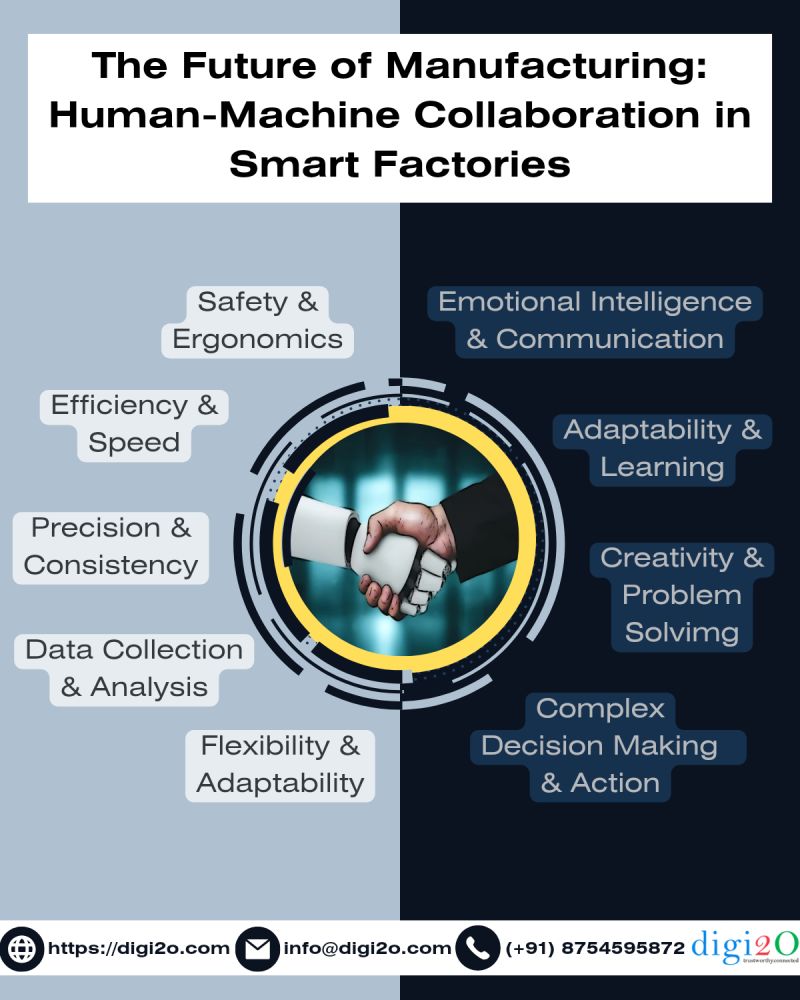
In the ever-evolving landscape of manufacturing, a powerful synergy between human workers and machines has emerged as a transformative force. The advent of Smart Factories has ushered in an era where artificial intelligence and robotics are revolutionizing our approach to production. This paradigm shift transcends mere technological advancements; it signifies an enhancement in collaboration between humans and machines, driving unprecedented efficiency, safety, and innovation.
1. Evolution of Smart Factories: A Technological Marvel
Smart Factories represent the pinnacle of manufacturing evolution. These facilities leverage advanced technologies such as artificial intelligence (AI) and robotics to optimize processes and streamline production. The integration of these technologies into the manufacturing workflow has led to remarkable improvements in efficiency and precision.
1.1 Efficiency Through Precision: The Heart of Smart Factories
One of the key hallmarks of Smart Factories is their ability to leverage AI and robotics to optimize processes, thereby reducing errors and increasing precision. Predictive maintenance and quality control are areas where these technologies shine. AI algorithms can predict equipment failures before they occur, enabling proactive maintenance that minimizes downtime. Additionally, robotic systems equipped with advanced sensors can ensure that every product meets the highest quality standards. This collaboration between human expertise and machine efficiency leads to products that are not only reliable but also of exceptional quality.
1.2 Enhanced Safety Measures: Protecting the Workforce
Safety is paramount in any manufacturing setting. Smart Factories address this concern by incorporating AI-powered sensors and robots that are capable of undertaking dangerous tasks. By delegating hazardous activities to machines, human workers can focus on tasks that require creativity, critical thinking, and problem-solving abilities. This ensures a safer working environment, reducing the risk of accidents and injuries.
2. Real-time Insights: The Power of Data in Manufacturing
In the realm of Smart Factories, data is king. AI-driven analytics provide real-time insights into operations, empowering human workers to make data-driven decisions. This collaboration between humans and machines not only enhances productivity but also enables the workforce to adapt swiftly to changing market demands. By harnessing the power of data analytics, manufacturers can optimize production schedules, predict market trends, and minimize waste, thereby ensuring a competitive edge in the market.
3. Upskilling Opportunities: Nurturing Talent for the Future
As machines take on repetitive and mundane tasks, human workers are presented with unique upskilling opportunities. Automation frees up valuable time and resources, allowing employees to focus on acquiring new skills and competencies. This continuous learning environment fosters career growth and job satisfaction among the workforce. Manufacturers can invest in training programs that enhance the technological proficiency of their employees, ensuring that they remain relevant and adaptable in an ever-changing industry.
4. Sustainability Impact: Smart Factories and Environmental Responsibility
In the pursuit of a sustainable future, Smart Factories play a pivotal role. Efficient resource utilization driven by AI reduces waste and energy consumption significantly. Machines equipped with sensors can optimize energy usage, ensuring that factories operate at peak efficiency while minimizing their carbon footprint. This collaboration between humans and machines aligns seamlessly with the global commitment to environmental conservation, making Smart Factories a beacon of sustainable manufacturing practices.
5. Digi2O: Pioneering the Smart Factory Revolution
At Digi2O, we stand at the forefront of this transformative journey. Our Smart Factory initiatives exemplify the power of human-machine collaboration. By integrating cutting-edge technologies and fostering a culture of innovation, we have redefined the manufacturing landscape. Through our commitment to excellence, efficiency, and sustainability, we continue to set new benchmarks in the industry.
6. Embracing the Future Together: A Call to Action
The future of manufacturing is undeniably intertwined with the collaboration between humans and machines. As we stand on the precipice of a new industrial revolution, it is imperative that businesses, policymakers, and educators join hands to nurture this collaboration. By investing in research and development, supporting educational initiatives, and creating conducive regulatory frameworks, society can harness the full potential of Smart Factories.
7. Conclusion: A Harmonious Future Beckons
In conclusion, the future of manufacturing lies in the harmonious collaboration between humans and machines. Smart Factories, powered by AI and robotics, represent the epitome of this collaboration, driving efficiency, safety, and innovation to unprecedented heights. As we embark on this transformative journey, it is essential to recognize the immense possibilities that lie ahead. By embracing the synergy between human expertise and machine efficiency, we can create a manufacturing ecosystem that is not only highly productive but also sustainable and socially responsible.
Designed by W3Squad